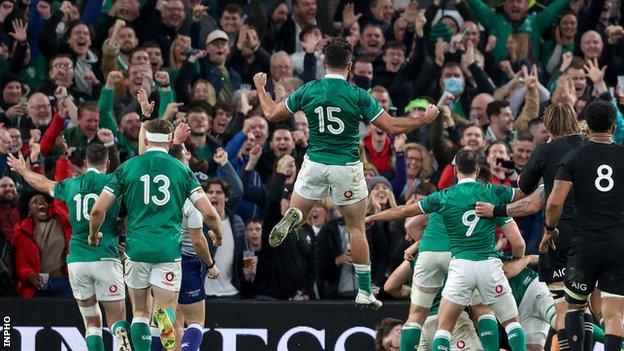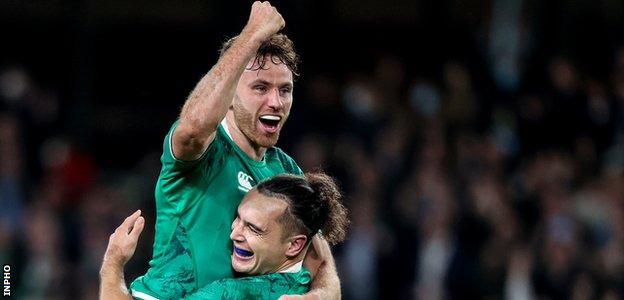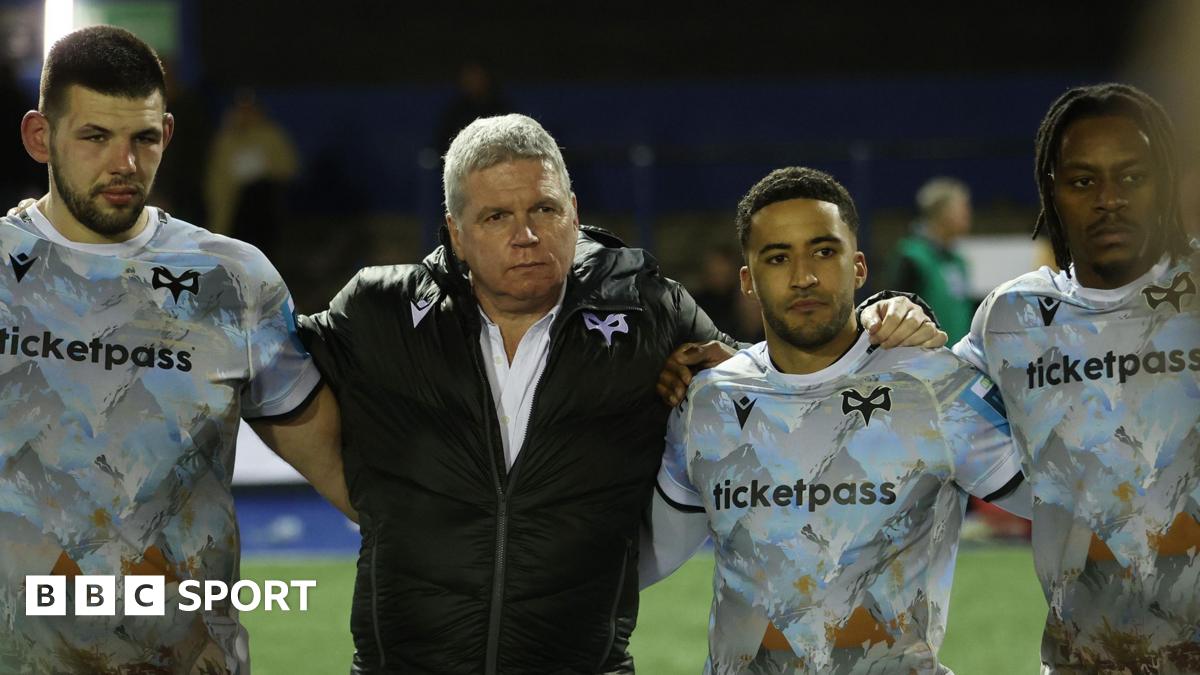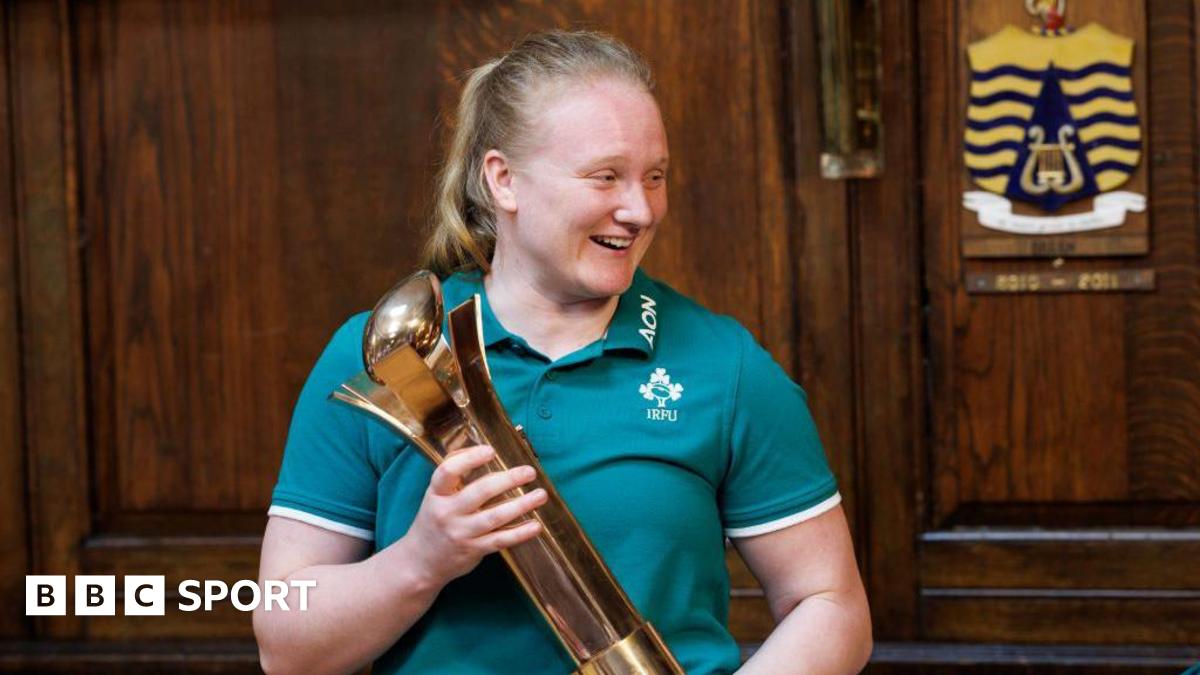ARTICLE AD BOX
 Ireland's win was delivered amid scenes not witnessed at the Aviva Stadium since pre-Covid times
Ireland's win was delivered amid scenes not witnessed at the Aviva Stadium since pre-Covid timesIf Andy Farrell was asked to create a single moment to symbolise the turnaround of his Ireland side, he might have come up with James Lowe's match-winning defensive read.
Dropped with instructions to work on his defensive game, no-one personified the early Farrell era struggles quite like Lowe.
And here he was nine months later, blitzing off his wing without hesitation to clatter Rieko Ioane and stop the All Blacks exploiting an overlap that would have seen them take the lead with seven minutes to go.
The moments that directly followed told some more of the story.
First Peter O'Mahony, whose reckless red card in the 14th minute of Ireland's Six Nations opener effectively ended their hopes of competing for the trophy in record time, latched over the top of Ioane. Despite the attention of several All Black clearers, the Munster man wasn't for moving.
Then it was Joey Carbery. Billed as Ireland's next great hope at fly-half, he was absent from Farrell's early games at the helm as a relentless run of injuries threatened to derail his career. But here he was with a penalty on halfway to suck the fight out of New Zealand and extend his side's lead to six.
- Sensational Ireland earn statement win over All Blacks
- Sexton calls on Ireland to ensure New Zealand win is not 'high point'
Each moment was made abundantly more powerful by the febrile crowd whose thunderous noise cast the mind back to the echoing, hollow games played out in front of empty seats over the last 18 months.
Test rugby's calendar saw the sport largely miss out on the initial wave of euphoria that met fans returning to stadiums. Under the lights in Dublin though the significance of 51,000 supporters, all almost as invested in the game as the men on the pitch, was lost on no-one.
It wasn't just the atmosphere that was transformed.
 Hugo Keenan and James Lowe have been introduced to the team since Andy Farrell took charge
Hugo Keenan and James Lowe have been introduced to the team since Andy Farrell took chargeThe outlook was bleak after a decidedly limp display at home to France yielded a second successive Six Nations defeat. Staring at the prospect of facing a buoyant Scotland before their chief tormentors England arrived in Dublin, one wondered where left there was for Ireland to go in search of inspiration.
Farrell's arrival brought promise of a clean break from the ultra-structured Joe Schmidt era which, while hugely successful and indeed enjoyable in parts, had run its course by the time Ireland arrived at the 2019 World Cup.
Promised an adventurous approach, Irish fans had visions of swashbuckling excitement from the get-go.
What followed was, in hindsight, an example of things being easier said than done as the players struggled to grasp the new-found freedom on offer.
It makes sense. Having spent years in a system where every detail, play and game situation was meticulously crafted, the new directive to play what they saw would have seemed as alien to the team as it did to the fans.
But since that loss to France, Ireland have not been defeated and something, although no-one is quite sure exactly what, has clicked.
A mental game transformed
There are tangible differences that help explain part of the turnaround. In the last three outings Ireland's starting front five have combined for an average of 20 passes per game, compared to nine in Farrell's first three matches.
There is a comfort in the system that simply didn't exist at the start. The shift required a change in style, but also one in mentality.
Against the All Blacks the Irish threw caution to the wind in a first half where they controlled territory and possession, only to be thwarted by other-worldly tryline defence before Codie Taylor's sucker punch try saw the visitors somehow take a lead into the sheds.
By their own admission, it was a scenario that might have sucked the life out of Ireland not too long ago.
"Previously we would have said we didn't take our chances, and we would have not given up but put our heads down," said Johnny Sexton.
"This team has worked a hell of a lot on our mental side of the game.
"To bounce back, to come again is a testament to the management, the leadership group and the players themselves."
'It is not a straight sprint to the World Cup from here'
As the delirious fans dispersed out into the Dublin night, Ireland were left to contend with exactly what this victory over New Zealand meant.
In the dressing room, Sexton revealed they were quick to acknowledge how this win must be different to the famous victory in 2018.
That result proved to be as good as it got for Ireland under Schmidt. It set them up as the best team in the world a year out from the World Cup - by the time they arrived in Japan they were not particularly close to being in the top five despite the oddities of the ranking system still having them at number one.
This time perhaps they can benefit from the fact that the next tournament in France is still two years away.
It is not a straight sprint to the World Cup from here. There are two Six Nations before then and, among other tasks, a three-Test tour in New Zealand.
Spoiler alert: Ireland's current unbeaten run will not last until the World Cup.
That is no bad thing. Because if Ireland have truly learned from what followed their win over the All Blacks in 2018, then they will have already accepted that bumps in the road will come and when they do, they cannot spark a crisis.
For now Andy Farrell and his Ireland team can take heart from the fact that they have a system that is now fully functional, and is good enough to challenge any team in the world.
That's an entirely different thing to beating any team in the world when the chips are really down at a World Cup.
But it's a good place to start.

- 'The hardest thing I've ever done': Can Robbie Savage turn Macclesfield F.C into a club the community can be proud of?
- Outlaws: Stephen Merchant and Christopher Walken star in community payback comedy


 3 years ago
96
3 years ago
96








 English (US) ·
English (US) ·